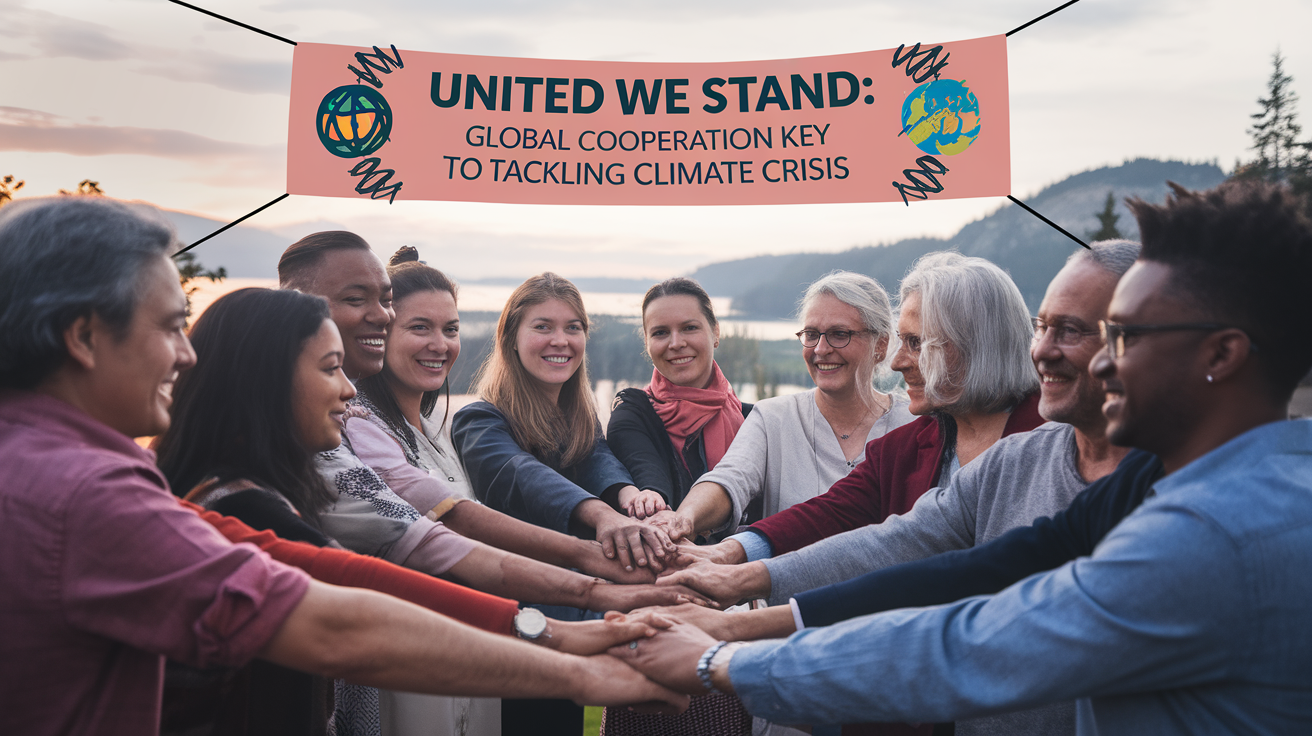United We Stand: Global Cooperation Key to Tackling Climate Crisis
The climate crisis is one of the most pressing issues of our time, with far-reaching consequences for the health of our planet and the well-being of its inhabitants. As the scientific consensus grows clearer on the urgency of the crisis, it is imperative that governments, organizations, and individuals work together to address its causes and effects. The concept of global cooperation is key to tackling the climate crisis, as it is only through a collective and sustained effort that we can hope to mitigate its impact.
Climate change is no longer a distant threat; it is already having a devastating impact on our environment, economy, and society. Rising temperatures are leading to more frequent and intense heatwaves, droughts, and storms, as well as more frequent and prolonged natural disasters. These extreme weather events are having catastrophic consequences, from lost livelihoods to lost lives, and are disproportionately affecting the world’s most vulnerable populations. It is our moral imperative to act to protect these vulnerable communities and ensure a sustainable future for all.
Global Cooperation – A Necessary evil?
One of the biggest obstacles to tackling the climate crisis is the lack of global cooperation. Many countries are unwilling to take drastic action, despite the scientific consensus that we have a limited window to take action. Some nations are more concerned with protecting their own economic interests, rather than working towards a common goal. Others may feel that the impact of climate change is being overstated or that there is not yet enough data to justify significant action.
Despite these challenges, it is clear that global cooperation is essential if we are to make progress on tackling the climate crisis. This means not only working with countries but also with cities, regions, and corporations. It also means leveraging new technologies, such as renewable energy, carbon capture and storage, and energy storage. Governments, civil society, and the private sector must all work together to address this global crisis.
The role of governments – A framework for cooperation
Governments have a crucial role to play in addressing the climate crisis, through both national and international agreements. They must put in place the necessary regulations, policies, and infrastructure to support the transition to a low-carbon economy. This includes setting carbon prices, increasing energy efficiency, and investing in clean energy. Governments must also provide a framework for international cooperation, such as agreements like the Paris Agreement.
Furthermore, governments must provide financial and technological support to developing countries to help them adapt to the impacts of climate change. This can be done through international agreements, like the Green Climate Fund, which provides financing to support the development and implementation of nationally determined climate plans.
The role of business and industry – Innovations for a sustainable future
Businesses and industries also have a critical role to play in addressing the climate crisis. Many companies are already taking significant steps to reduce their emissions and invest in clean technologies. However, more can be done. Governments can work with businesses to set emission reduction targets and implement policies to support the transition to a low-carbon economy.
Businesses must also be innovative in finding solutions to reduce their own emissions. This can be achieved through new technologies, sustainable practices, and collaborative initiatives. Moreover, industries such as finance, manufacturing, and construction must play a significant role in transforming our energy system and driving a sustainable economic growth.
The role of civil society – A platform for mobilization
Civil society plays a crucial role in tackling the climate crisis, not only through grassroots activism and awareness-raising but also by influencing public policy and corporate practices. Civil society organizations, community groups, and indigenous peoples’ movements can work together to create a collective platform for mobilization, promoting climate action and climate justice.
They must also support and advocate for policy reforms, promoting policies that are equitable and effective in reducing emissions and supporting the most vulnerable populations. Additionally, civil society organizations must raise awareness and engage communities, promoting behavior change and advocating for systemic transformations that can address the climate crisis.
International Agreements – Building blocks for climate action
International agreements play a critical role in setting global goals and mobilizing action to address the climate crisis. The Paris Agreement is a landmark achievement in global climate governance, bringing together nearly 200 countries to limit global warming to well below 2 degrees Celsius above pre-industrial levels.
International agreements like the Paris Agreement provide a framework for cooperation, sharing best practices, and mobilizing finance and technology to support the development of low-carbon economies. They also offer a platform for countries to report on their progress and set targets for reducing their greenhouse gas emissions.
Conclusion: Tackling the Climate Crisis through Global Cooperation
In conclusion, global cooperation is key to tackling the climate crisis. This means not only working together with countries, cities, regions, and corporations but also with civil society organizations, indigenous peoples’ movements, and grassroots activists. International agreements provide a framework for cooperation, sharing best practices, and mobilizing finance and technology to support the development of low-carbon economies.
The world has already come a long way in acknowledging the need for climate action, and there is now a greater awareness and sense of urgency. But to achieve real change, we must act now, working together and embracing global cooperation as a means to ensure a sustainable future for all. United, we can stand tall and fight the climate crisis together.







